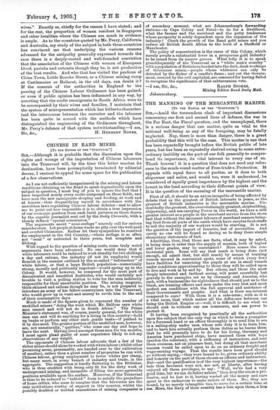ITO THE EDITOR OF THE "SPECTATOR. "] Sin,—Although it is probable
that the discussion upon the rights and wrongs of the importation of Chinese labourers into the Transvaal will, by the time this letter reaches its destination, have been peremptorily terminated by editorial decree, I venture to appeal for some space for the publication of a few observations.
As I am not sufficiently inexperienced in the mining. and labour conditions obtaining on the Rand to speak dogmatically upon the subject in question, I must beg of you to ignore the fact that I
have inspected nearly every coolie compound on these fields, and have seen the new immigrants sleeping and feeding, at work and at leisure—thus disqualifying myself in accordance with the
unwritten laws regulating Chinese labour debates—and to allow me to point out how impossible it is to obtain a true impression of our economic position from such lurid pictures as those drawn by the capable journalist sent out by the Daily Chronicle, with a clearly defined "special commission."
The arguments anent " semi-serfage " scarcely call for serious consideration. Let people at home waste no pity over the well-paid and overfed Chinaman. Rather let their sympathies be reserved for employment in the Old Country,—where serfage is so often not " semi " or restricted to three years, but complete and lifelong. With regard to the question of mining costs, some truly weird arguments have been advanced. No one would deny that if white labourers could be induced to work steadily for two shillings
a day and rations, the industry (if not its employes) would flourish in the manner outlined by the so-called " befrienders" of
white labour,. or that a large British population—numerically strong, morally and politically impotent—would spring up in the Colony. It would, however, be composed for the most part of discontented and unsettled destitutes, who would certainly not trouble to visit a polling station to vote for the men indirectly responsible for their unenviable position. The mining magnate, thick-skinned and callous though he may be, is not prepared to introduce an army of his fellow-countrymen into the Transvaal, who would grow up in want and misery to revile him to the end of their consumptive days. Much is made of the figures given to represent the number of unskilled miners "doing the work which Mr. Balfour says white
men cannot and will not do in South Africa." The Prime Minister's statement was, of course, purely general, for the white man can and will do anything for a living in this country—hold
up banks or perform any other such gentle tasks—if pushed to it by dire need. The greater portion of the unskilled men, however, are, not unnaturally, quitters," who come one day and hope to
leave the next. Having lived amongst these men for ten months, I must again plead guilty of some experience likely to rob my observations of any weight.
The opponents of Chinese labour advocate that a few of the richer mines should alone be worked with white labour (whilst other promising areas, presumably, are handed over to the cultivation of mealies), rather than a great number of properties be run with Chinese labour, giving employment to fewer whites per stamp,
but many more, in every branch of industry and trade, in the aggregate. The suggestion is hardly flattering to the Britisher, who is thus credited with being only fit for the dirty work of underground mining, and incapable of filling the more agreeable positions available upon the surface. Moreover, if the Transvaal is thus to be reduced to " tabloid" form to satisfy the prejudices of home critics, who seem to imagine that the breweries are the only institutions worthy of support in this country, whilst the possibly doubled. or trebled expenditure of mining companies is of secondary moment, what are Johannesburg's forwarding stations—in Cape Colony and Natal—to do for a livelihood, what the farmer and the merchant and the petty tradesman whose prosperity is solely dependent upon the expansion of the industry? Check the growth of the Band gold mines and you reduce all British South Africa to the level of a Sheffield or Manchester.
The policy of concentration is the curse of this Colony, which merely awaits a substantial lever in a prosperous gold industry to be raised from its narrow groove. What folly it is to speak grandiloquently of the Transvaal as a "white man's country" with a population of Britishers herded into the dark, dank workings of threescore mines,—people whose whiteness can only be detected by the flicker of a candle's flame ; and yet the Govern- ment, coerced by the evil capitalist, are censured for having failed to recognise the significance of that subterranean vote.
—I am, Sir, &c., RALPH STOKES,
Johannesburg.
THE MANNING OF THE MERCANTILE MARINE.










































 Previous page
Previous page